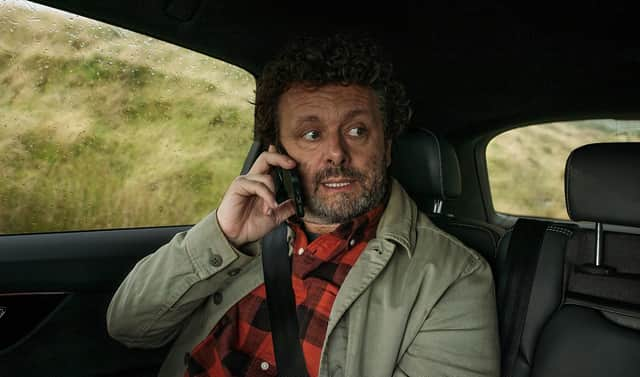Aidan Smith: Why local roles for local people just wouldn't work


A fine actor, he gets his pick of the good roles. A proud Welshman, he can play characters with a slight valleys lilt like the one in Best Interests where Welshness is not the most important thing about them. Then in Staged, as a hammed-up version of himself, he can go the full Brecon Beacons - or as they’ve just been renamed, in Welsh, Bannau Brycheiniog - for a Celtic arm-wrestle via Zoom with our own David Tennant.
The preeminent thespian boyo, Sheen will never want for work requiring a Welsh accent. Ah, but he’s brilliant at other accents, too. Tony Blair, David Frost and Brian Clough are three towering figures who would daunt other actors lacking his vocal wizardry. Except … should he even have been allowed near the roles?
Advertisement
Hide AdAdvertisement
Hide AdSheen himself no less envisages a perfect world where the Welsh are played by the Welsh. He says he finds it “very hard to accept” anything else.
Presumably by extension, then, Americans should be played by Americans and nothing but. Outer Mongolians by Outer Mongolians - not those Inner guys, perish the thought - and, yes, Scots by Scots.
A local shop for local people. Remember that sketch in The League of Gentlemen? The store was run by a couple so psychotically insular they couldn’t even conceive of a far-off, exotic place called “Swansea”. To extend the Sheen rule still further, does he want Swansea roles being awarded only to Swansea actors and Cardiff roles only to Cardiff actors?
How grim, how ludicrous. To be fair to Sheen, there is no actual rule which he wants set in stone or Welsh slate (though I bet a Richard Burton biopic starring Danny Dyer would have him marching on the Senedd in protest).
But acting is pretending to be someone you’re not; that’s the point of it. Sheen must have enrolled in drama school with the dream of playing a whole bunch of folk.
If there was such a rule about authentic casting then Sheen would have never have been allowed to play the Middlesbrough-born Clough. Did the people of Teesside object to his portrayal in The Damned United? Probably not, because Sheen’s accents invariably hit the back of the net, so much so that he gets irked when he feels appreciation majors on his gift for mimicry. But he doesn’t know when he’s well off. Other actors can spend a lifetime apologising for bad accents. Dick Van Dyke, for instance, admits he’s been ridiculed for his risible Cockney in Mary Poppins for more than half a century. And we Scots just love to point out when an accent goes wrong.
There was a survey a few years back which placed our dulcet tones behind those of England, Ireland, America, Russia, Australia and Greece as toughest to master. But we’re surely higher up the league of the mortally offended.
This is silly. When I hear a lousy Scottish accent on TV or in the movies I just laugh. I’m not hurt or feel that my nation has been insulted most horrendously. A lousy Scottish accent reflects badly on the actor, not us.
Advertisement
Hide AdAdvertisement
Hide AdIndeed, it’s slightly annoying that we’re not viewed as being especially tricky to imitate. After all, who doesn’t want to be thought of as mystical and special?
There are lots of lists of worst-ever, the crummiest depiction of Caledonia committed to celluloid. Hunners and hunners o’ them. Everything from the episode of Scooby Doo titled “A Highland Fling With a Monstrous Thing” where Thelma’s friend Aggie MacDuff sounds Swedish - to estimable acting talent like Cate Blanchett in How To Train Your Dragon breathing not so much flames but raw mince.
Speaking of which, what does it matter that Star Trek’s Scotty uttering the immortal line “Aye, the haggis is in the fire, for sure” suggests James Doohan might not have ever sampled the national dish? He took it and the engineer’s purported birthplace of Linlithgow to the final frontier.
In Indiana Jones and the Last Crusade, Harrison Ford purports to be Lord Clarence MacDonald. This surprises a German butler who says: “If you are a Scottish lord then I’m Mickey Mouse.” The German doesn’t sound very German, but I bet he enjoyed not being himself, the reason he acts.
Really, talking Scots on screen must be a challenge because we’re not just one way of speaking but many regional variations. Some attempts can sound like a megamix or macmegamix of quite a few. Admittedly there have been actors who have lazily parroted the most Scottish voice they know - Janet from Dr Finlay’s Casebook, perhaps, or that gravel-gargling rail union boss Jimmy Knapp - but if we trust the profession many more will do the research and find job satisfaction in not appearing on those infernal lists.
And maybe playing Scottish is getting easier. Research by the University of Glasgow and Edinburgh’s Queen Margaret University found that our distinctive rolling “r” is disappearing. In words like “car” and “fur”, younger Scots don’t pronounce it as forcefully as older generations. They wouldn’t say “There’s been a murrrdurrr” the way Taggart did and hopefully don’t ever request: “Deep-fried Marrrs barrr supper, please.”
So Michael Sheen, I hear what you’re saying, and how you speak in your many and varied voices, but if it was local roles for local actors you’d be denying yourself work. And while Mel Gibson continues to be much ridiculed for Braveheart, would an all-tartan remake starring Alan Cumming really be an improvement? Or – michty me – someone from River City? …
Comments
Want to join the conversation? Please or to comment on this article.